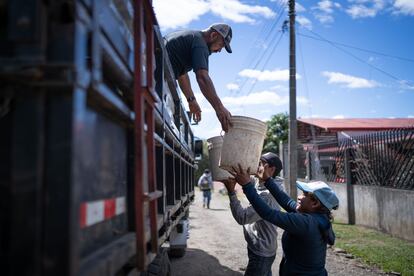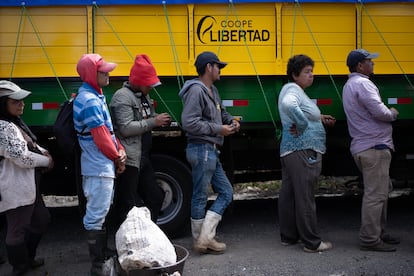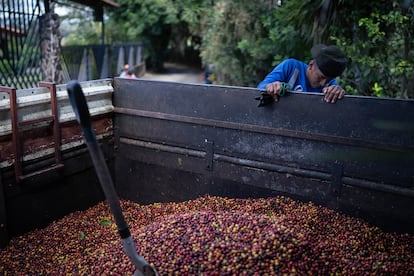Costa Rica guarantees fair compensation and benefits for coffee pickers
Economic, political and climate turmoil are buffeting the industry, but thousands of migrant harvesters will now have insurance for the first time

“I had a full bag on my shoulders when I stepped into a hole that was covered with leaves. I hurt myself badly and had a swollen ankle for a week. It was a sprain, not a fracture. But it hurt and I couldn’t walk. I saw a doctor who did some x-rays and gave me some ointment and pain pills. I’m fine now.” Juan Canda is one of the thousands of Nicaraguans working in Costa Rica’s coffee industry. This year, he was able to obtain insurance for work-related accidents and general health insurance. The 53-year-old man can’t remember the last time he saw a doctor in his hometown on Nicaragua’s Pacific coast. That’s where he was recruited a few months ago for seasonal coffee-picking work on Costa Rican plantations.
Canda is one of 40 pickers who recently harvested the last beans of the season from a coffee plantation in Barva de Heredia (central Costa Rica). A long-standing bulwark of the Costa Rican economy, coffee plantations are slowly being edged out by new residential developments, reflecting an accelerated trend driven by international instability (over 85% of Costa Rican coffee is exported), a weaker dollar, climate change and labor supply challenges.
Juan Canda and his coworkers are highly valued, says one supervisor, who believes it’s important to prioritize social sustainability in Costa Rican coffee, which enhances its prestige in international gourmet markets. Worker benefits now include a new work accident insurance policy for 15,700 people, in addition to the health insurance plan for illness and maternity launched three years ago as part of a social responsibility program sponsored by private growers and the government.
“During these challenging times, Costa Rican coffee has to uphold social and environmental responsibility, as well as high quality. These are the things that set us apart in the world. Providing fair conditions to the pickers benefits them, of course, but it also benefits the whole sector,” said Guillermo Trejos, manager of CoopeLibertad, a cooperative of nearly 1,200 coffee producers from Costa Rica’s central valley that exports specialty coffee to the United States, Europe and Asia.
The 55 pounds of export-quality coffee beans that Canda picked in four hours on a Saturday morning earned him $5. While it doesn’t seem like much, Canda was able to add it to his earnings for the week, and it’s much more than what he could earn in Nicaragua, where political turmoil has been shutting down farms. “I don’t complain about what I earn. It’s good, and now I can see a doctor if I’m hurt or sick,” said Canda as he and other workers boarded a truck at the end of the day.

Migrants make up over 75% of the 20,000 workers who follow the harvest seasons around Costa Rica. Many are from Nicaragua, but others are Ngäbe-Buglé Indigenous peoples from Panama. All are vital during the intense harvest months of November, December and January. It’s an annual ritual that often involves entire families coming to support the entire coffee supply chain, and Costa Rica has committed to benefitting growers more than the intermediaries and exporters.
“It’s a distinct legal framework to establish equitable relationships in the industry,” said María José Castillo, deputy director of the Costa Rican Coffee Institute (ICAFE), the organization that designed the new insurance benefits for coffee workers. Health insurance was first offered three years ago to cover illness and maternity for pickers and their families. Castillo highlighted this as a reason for international organizations’ interest in replicating their model in other countries. Work accident coverage has now been added. “These are difficult, changing times. There are factors that we can’t really control, but we want the end consumer to understand that behind that cup of coffee, there’s a great deal of solidarity, and that’s part of what makes the product so good,” said Castillo.
The new worker benefits align with Costa Rica’s traditional social security model, which historically positioned the country favorably in terms of quality of life. But it’s a model that is increasingly under threat on several fronts. The coffee worker benefits also align with the legal framework Castillo mentioned, and the Labor Ministry’s focus on ethical treatment of workers. Guillermo Trejos and many other exporters hope these measures will drive favorable prices from the more sophisticated international markets.
“The concern is that with high global supply, coffee prices may decrease and the premium for Costa Rican coffee may shrink. However, we believe there are buyers who value the social responsibility aspect,” said Trejos. Costa Rican coffee prices were 65% above market average in December 2023. However, the price has been falling from $3.20 a pound in January 2022 to $2.30 in December. The U.S. dollar has also dropped 27% against the Costa Rican colón in the last 18 months, eroding export profits.
In 2023, changes in weather patterns forced earlier harvests, disrupting the scheduling of seasonal workers and reducing productivity. Widespread protests in Panama blocked roads, hindering workers traveling from that country to Costa Rica. Both disruptions resulted in a projected 12.6% decline in the current harvest, with an estimated 1,672,881 bushels. This would be the smallest harvest in a century, less than half the volume harvested in 2000.
“These conditions are indeed causing some pessimism in the sector, despite what the Agriculture Minister says. But we’re committed to the current model and making it better through innovation,” said Trejos. These innovations include day care centers for children that offer meals, recreation and education while their parents are at work.

The worker benefit programs are funded by taxes and contributions from coffee retailers who are all committed to becoming “a more competitive sector, and at the same time respectful of worker rights,” said Agriculture Minister Víctor Carvajal in October 2023 when he announced the work-related accident insurance program.
Cristian Flores and his wife came from Nicaragua for the harvest season, unaware of the available insurance and child care options for the kids they left with their grandmother. “It’s my first time here, and I was surprised because I didn’t know that I could see a doctor or get medicine if something happens. It really took me by surprise, and it’s actually pretty good. We came from a bad situation, and this is a good outcome. Now I think we’ll probably come back for the next harvest and maybe bring the kids along,” said the 27-year-old. Flores has already found a spot where they’ll take care of the kids while he picks as much coffee as possible.
Sign up for our weekly newsletter to get more English-language news coverage from EL PAÍS USA Edition
Tu suscripción se está usando en otro dispositivo
¿Quieres añadir otro usuario a tu suscripción?
Si continúas leyendo en este dispositivo, no se podrá leer en el otro.
FlechaTu suscripción se está usando en otro dispositivo y solo puedes acceder a EL PAÍS desde un dispositivo a la vez.
Si quieres compartir tu cuenta, cambia tu suscripción a la modalidad Premium, así podrás añadir otro usuario. Cada uno accederá con su propia cuenta de email, lo que os permitirá personalizar vuestra experiencia en EL PAÍS.
¿Tienes una suscripción de empresa? Accede aquí para contratar más cuentas.
En el caso de no saber quién está usando tu cuenta, te recomendamos cambiar tu contraseña aquí.
Si decides continuar compartiendo tu cuenta, este mensaje se mostrará en tu dispositivo y en el de la otra persona que está usando tu cuenta de forma indefinida, afectando a tu experiencia de lectura. Puedes consultar aquí los términos y condiciones de la suscripción digital.








































